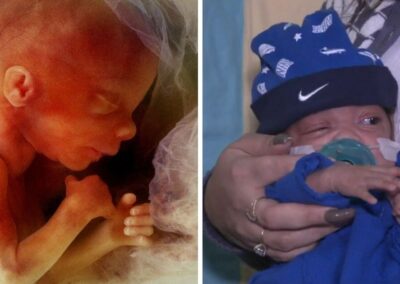A baby boy whose parents were told that he was not expected to survive the night of his birth has gone home after almost a year in hospital.
Lilly Pearce, 25, went into labour unexpectedly at 23 weeks and six days. She was transferred from Dorset County Hospital to Portsmouth Queen Anne Hospital, where her son Bobby was born at just shy of 24 weeks. He weighed 577 grams, just over half a bag of sugar, and was a similar size to his father’s hand.
Bobby defied expectations immediately, crying at birth despite his parents having been told that he wouldn’t due to his underdeveloped lungs, and then surviving the night against the expectations of doctors.
“You are so scared that you are not sure what is going on. It doesn’t feel real”, Lilly said.
“He did well for the first 24 – 32 hours but then he developed sepsis, which resulted in grade three and four bleeds on his brain. They told us he would not make it. That there was nothing they could do to help him”.
“But he decided he was not quite done yet, and came out the other side of it”.
Bobby still had a long way to go in spite of his initial fight for survival
At 14 days old, he was taken to a hospital in Southampton for emergency surgery to fix a perforated bowel.
Overall, Bobby spent six months in the neonatal intensive care unit and four months in paediatric high dependency.
“He struggled to get off ventilation and we were told to prepare for the worst and even put in an end-of-life room”, said Lilly.
“We were told multiple times he would not come home”.
However, after spending 314 days in hospital, Bobby was finally able to come home with his parents.
“They told us he would never breathe without a ventilator, but now he can with only a little oxygen”, his mother said. “Now we are just relieved. It is incredible, it doesn’t quite feel real yet, it feels whole – it feels good”.
“I am looking forward to seeing him growing up and making lots of memories”.
Survival rates have improved for babies born below the abortion limit
At 23 weeks and 6 days, Bobby was born just shy of the current UK abortion limit of 24 weeks.
The last time the abortion limit was lowered in 1990, the improved survival rates for extremely prematurely born babies was one of the key considerations that motivated this change.
By the same logic, and informed by the improved survival rates for babies born at 22 and 23 weeks gestation, the abortion time limit should also be lowered now. Key studies in recent years have documented the improving outcomes for these babies.
A 2008 study looking at survival rates for a neonatal intensive care unit in London found that neonatal survival rates at 22 and 23 weeks gestation had improved over time. In 1981-85, no babies who were born at these gestational ages survived to discharge. However, by 1986-90, 19% did and this increased to 54% in the period 1996-2000.
In the decade to 2019 alone, the survival rate for extremely premature babies born at 23 weeks doubled, prompting new guidance from the British Association of Perinatal Medicine (BAPM) that enables doctors to intervene to save premature babies from 22 weeks gestation. The previous clinical guidance, drafted in 2008, set the standard that babies who were born before 23 weeks gestation should not be resuscitated.
Spokesperson for Right To Life UK, Catherine Robinson, said “We are delighted to hear that baby Bobby has been able to go home after such a long battle in hospital. His story is a testimony to the perseverance of the human spirit, as well as the medical advances that are enabling children born at such an early age to survive despite expectations to the contrary”.












